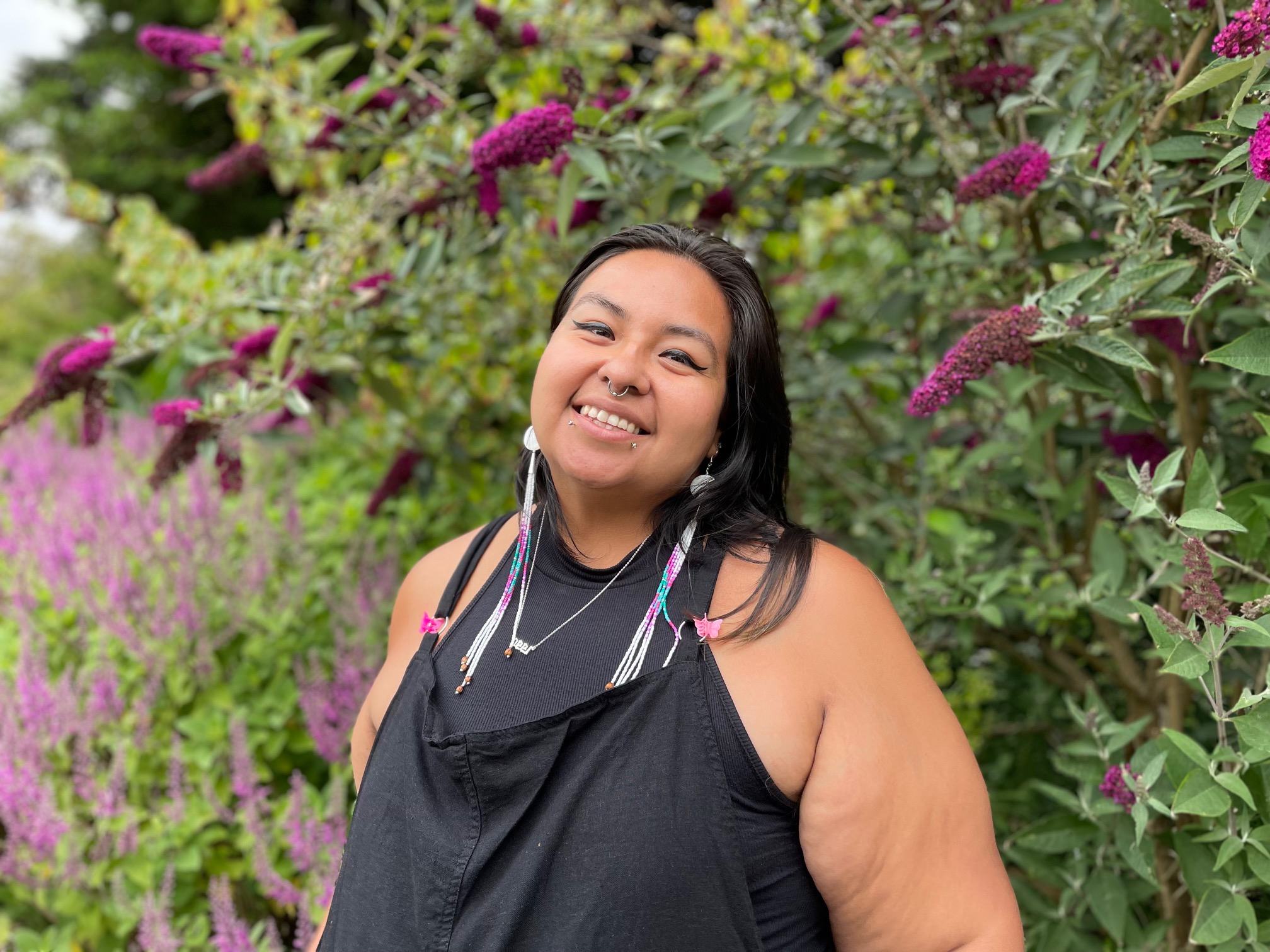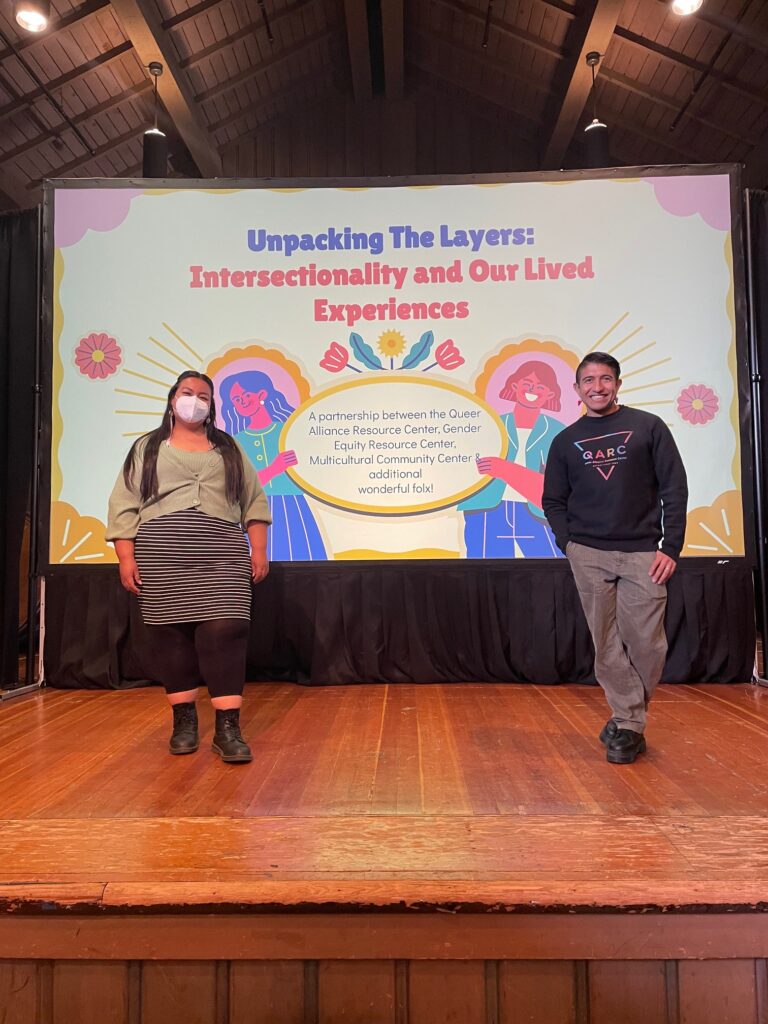How one Gender Equity staff member fosters community for LGBTQ+ students on campus
Joanna Villegas, the assistant director of student programs and leadership at the Gender Equity Resource Center, reflects on the work they do and shares resources available for students.

Courtesy of Joanna Villegas
June 26, 2025
Joanna Villegas is the assistant director of student programs and leadership at the Gender Equity (GenEq) Resource Center. Located in the César Chávez Student Center, GenEq hosts ongoing programs and events, providing students with holistic support and resources to foster an inclusive campus climate. In this first-person narrative, they tell UC Berkeley News about how they came to work in student support services and share the multitude of resources available for LGBTQ+ students at Berkeley.
I’m a queer, pansexual, nonbinary femme. I had really short hair for a long time, and in the pandemic I decided to grow my hair out, which changed the way people perceive me. I talk about the ways that nonbinary femmes exist in the world: Our identities are still valid, even if sometimes they get erased by the way people interpret our gender expression. My long hair also connects me to my cultural Indigenous roots, so it’s really important to be able to bring all parts of me to my work.
My family knows who I am — they know that I’m queer, they’ve met my partner and met my extended community. I think with family, there’s a breadth of response. Their first response is, honestly, fear. They’re scared for me, which comes from a place of love. They’re scared in the ways they see the communities I work with and the identities I have talked about in the media, and the violence that we experience because of our identities.

Courtesy of Joanna Villegas
There’s almost an understanding that anonymity could be safer: If you’re visible, you’re more susceptible to violence or hate. But for me, it’s really important to have conversations with family where they know that receiving affirmation about my identities, and who they see me to be, and who they know me to be, are actually more powerful than wanting me to be safe by hiding — because that’s not actual safety. Safety comes from having a support base being like, “I’m so proud of you. I love who you are, what you bring to the world, the community, the family.”
I grew up in Logan Heights, in San Diego — Kumeyaay land — in the ‘90s. Home and community are our first teachers, so I’ve learned a lot about the need for social justice work through my childhood experiences. My family and I relied a lot on programs, services and local community clinics to get care and support. School was really important. My parents were very encouraging about us committing to our studies, they worked really hard to make sure that we had access to good schools.
When I was graduating high school, I was at a crossroads. Do I commit to enrolling in a university, knowing I had a really hard time in school because of hardships? I started thinking, what would it look like to enroll in a community college, and then transfer? I went to San Diego City College, and I got a lot of support through student clubs and institutional resources on campus, like EOP (Educational Opportunity Program). When I applied to transfer, I got accepted to several UCs.
I’ve been doing student-facing work for many years. I’ve done anything from basic needs support work and helping folks with food insecurity to transfer student-related work and cultural identity development work. I see it as cultural work to work in a space that is supporting education across gender and sexuality, with women and LGBTQ+ communities, because you have to really think about the people that you’re working with holistically. Having an intersectional lens is so important.
Our mission at GenEq is to foster an inclusive campus community. What informs our work is who’s in the community space, trends among students, the needs that folks are bringing in. One of the main ways we stay really connected to the student body is through our student internship program, which I help run. We have both undergrad and graduate student interns that help run our space, programs, initiatives and social media presence.
There’s so many of us who are rooting for our survival, and not just our survival, but our thriving.
We have ongoing initiatives, like the Trans Student Wellness Initiative, which is shared between GenEq and the Multicultural Community Center. We have Queer Cal Pals, which is meant to support folks who are new to campus in building their social circles and learning about Berkeley’s resources. We also host Cal Self-Defense for All classes. Part of the goal is to collaborate with established clubs and departments on campus to bring the resources to folks.
QTPie is a semesterly welcome event planned by our undergrad students with the guidance of myself and Em Huang. It’s a really beautiful moment to witness students see how big the community is. We easily have about 300 students come out. With the support of the Queer Alliance Resource Center, we invite registered student orgs and clubs on campus that are LGBTQ+-centered, along with campus resources like the Basic Needs Center and University Health Services.
Witnessing the undergrads emcee the event, and getting into the headspace of how to hype up the crowd — “When I say QT, you say pie!” — it’s precious to see students feel really empowered to bring their community together, and to remind them that there’s resources for you, there’s support for you, we’re here. Look around: There’s so many people that want to see you thrive.
I see my work as being a steward, and also having these big intergenerational conversations with people in these spaces.
In our Trans Health Panel, the intern leads come up with their own questions they’re curious about in relation to trans health and run the panels. The fall focuses on the social aspects of transitioning, while in the spring, community providers and folks from University Health Services come and talk about gender-affirming health care — what is available to them, and what resonates for them for where they are in their journey. What I love is creating a space where folks can see themselves reflected in each other through their questions, anxieties and fears, and really just feel held in it.
Every generation brings up new questions for the previous generation, and I think that’s really beautiful and a fun part of my job. I see my work as being a steward, and also having these big intergenerational conversations with people in these spaces. That’s a really beautiful thing about our community: Everyone’s contributions and voices are important, so how are we integrating them to build the campus life and culture we’re experiencing?
Within community spaces, there’s a lot of grief and rightful rage right now for the ways communities are being targeted, particularly trans communities. There’s also a lot of mobilizing, and reminding folks of all the resources that are still here. That is so important: We need to know how to tend to our grief, because we want to be embodied humans, and at the same time, it’s really important to not feel disempowered by everything we’re seeing. There’s so many of us who are rooting for our survival, and not only our survival, but our thriving.